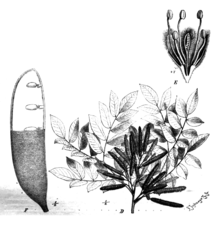Erythrophleum suaveolens, also known as the ordeal tree, is a species of flowering plant that can be found across most of tropical Africa.[2] The species are 20 metres (66 ft) in height, and have a rough and blackish bark. The plants leaves have 2–3 pairs of pinnae, which carry 7–13 leaflets. The leaflets are 5 by 2.5 centimetres (1.97 in × 0.98 in), are green coloured and ovate. The flowers have fluffy spikes, and are creamy-yellow coloured. Fruits are hard, the pod of which is flat.[3]
| Erythrophleum suaveolens | |
|---|---|

| |
| Scientific classification | |
| Kingdom: | Plantae |
| Clade: | Tracheophytes |
| Clade: | Angiosperms |
| Clade: | Eudicots |
| Clade: | Rosids |
| Order: | Fabales |
| Family: | Fabaceae |
| Subfamily: | Caesalpinioideae |
| Genus: | Erythrophleum |
| Species: | E. suaveolens
|
| Binomial name | |
| Erythrophleum suaveolens | |
| Synonyms[1] | |
|
List
| |
The bark of the tree has been used in Liberia to make a toxic concoction used for a form of trial by ordeal called "sassywood".[4] This use has given it the common name of the "Ordeal Tree".[5]

References
edit- ^ "Erythrophleum suaveolens (Guill. & Perr.) Brenan". Plants of the World Online. Board of Trustees of the Royal Botanic Gardens, Kew. Retrieved 10 April 2021.
- ^ "Flora of Mozambique: Species information: Erythrophleum suaveolens". www.mozambiqueflora.com. Retrieved 2017-08-04.
- ^ "Flora of Zimbabwe: Species information: Erythrophleum suaveolens". www.zimbabweflora.co.zw. Retrieved 2017-08-04.
- ^ Leeson, P. T.; Coyne, C. J. (2012). "Sassywood" (PDF). Journal of Comparative Economics. 40 (4): 608. doi:10.1016/j.jce.2012.02.002.
- ^ "Erythrophleum suaveolens". Urban Forest. Retrieved 27 December 2015.
External links
edit